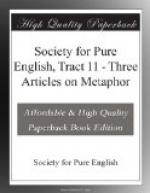There was nothing like it in the histories of the ancient European monarchies, hide-bound by caste and now lying on the scrap-heaps of Switzerland and Holland. In the more forward nations, the new republics, men have indeed risen from humble beginnings to high station, but not generally by constitutional means and usually only (as now in Russia) by wading to their places through blood. The dizzy height to which Lloyd George has attained, not as a British statesman only but also as a world celebrity, seems to leave the foreign nations breathless. It is a spectacle that has of itself some of the thrill and fascination of romance.
Here are metaphors that might be used, or have been used, so as to surprise the reader; but in this case they are stock-ornaments to a passage that needs no ornament. If the metaphors in the first sentence were alive to us they would be mixed; at least the transition from monarchies hide-bound by caste to monarchies lying on scrap-heaps would be too sudden; but we hardly notice it because we hardly notice the metaphors. And there is an inconsistency in the notion of rising by wading which, again, we do not notice only because we are so used to rising and wading as metaphors that both have lost their power as images. Mr. Lloyd George has waded to such a dizzy height that he seems to leave foreign nations breathless; and we should be breathless at the thought of such an impossibility if the metaphors were not dead.
It is indeed the mark of a dead metaphor that it escapes absurdity only by being dead. The term has been used for metaphors that have lost all metaphorical significance; but these, perhaps, are better called buried metaphors. I prefer to use the word dead of metaphors not yet buried but demanding burial. ‘Risen from humble beginnings’ is perhaps a buried metaphor; ‘wading to their places through blood’ is a dead one. It has been used so often that it jades instead of horrifying us; it is a corpse that fails to make us think of corpses. But in the next sentence the writer returns to the metaphor of rising and elaborates it so that it is no longer buried, though certainly dead. We are vaguely aware of the sense of this passage, but the metaphors are a hindrance, not a help, to our understanding of it.
Writers fall into habitual metaphor when they fear that their thought will seem too commonplace without ornament; and, because the motive is unconscious, they choose metaphors familiar to themselves and their readers. The article from which I have quoted contains many such metaphors. Mr. Lloyd George is ’like other men only cast in bigger mould’. He is ‘clearly no plaster saint’. ’You cannot think of him in relation to the knock-out blow except as the man who gives, not receives, it.’ ’He has never lost his head on the dizzy height to which he has so suddenly attained. He is clearly in no danger of the intoxicating impulse of the people who find themselves for the first time on great eminences, to leap over. In a word, he is not spoiled.’ Here the writer, as he would put it, gives himself away. All that metaphor means only that Mr. George is not spoiled, and the fact that he is not spoiled would be established better by instances than by metaphors.




